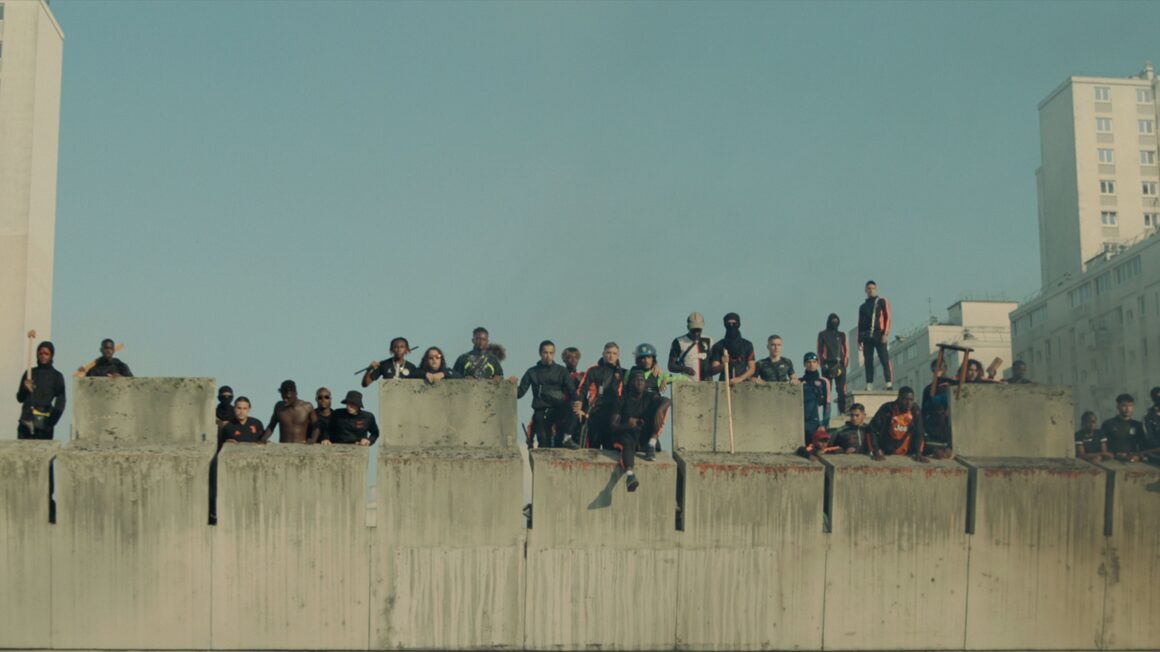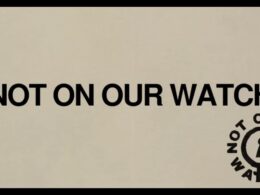Athena
Directed by Romain Gavras
Netflix, 2022
Reviewed by Eddie McCabe
(spoiler warning)
For its exhilarating 11-minute opening sequence alone, which culminates in the defiant stand of a youth rebellion in the tower blocks of a banlieue as it ominously awaits confrontation with the French police, Athena is well worth watching.
The fast pace, long shots and jerky camerawork continue throughout the film, and are combined with an operatic score that give an epic feel to this Greek tragedy centered around four brothers of Algerian origin, and their conflicting roles during an uprising sparked the brutal murder of the youngest brother, 13-year-old Idir. Footage of the killing has gone viral, showing a gang of uniformed but unidentifiable police as the culprits.
In a French society riven by social tensions, and in the wake of numerous similar incidents of police brutality, a social explosion is ignited.
The three other brothers are: Abdul, a soldier in the French army whose aim is to try to keep the peace in his community of Athena; his younger brother Karim, a sort of community leader who’s leading the rebellion – demanding justice for Idir and the identity of the killers by exacting revenge on the state suspected of shielding them; and their older brother Moktar, a violent drug dealer whose sole concern is for his criminal enterprise.
As they pursue their own ventures, and as the tumult engulfs the high-rise buildings that house their community, the brothers cross paths and clash, with devastating results.
The film, written and directed by Romain Gavras, is of the genre of urban French films such as La Haine (1995) and Les Miserables (2019). In fact, Ladj Ly, who wrote and directed Les Miserables co-wrote the screenplay with Gavras. Naturally the two films will be compared. Both are stunningly produced, well cast and depict a revolt of young people from deprived Parisian suburbs against a repressive and discriminatory police force.
Whereas Les Miserables builds up tension towards a gloriously climactic uprising, Athena launches us into it from the off, albeit with a rocket launcher. Unfortunately, however, while it tries to keep up the momentum, and does a decent job, it doesn’t get better than the opening, and the ending is incredibly disappointing.
As a depiction of real social issues, and the lives of people in such neighbourhoods, Les Miserables clearly has more depth to it, and insights about society, struggle and justice. With Athena, although the plight of the brothers – who are used to represent different layers of working-class, immigrant society – is quite engrossing, the political content is much more superficial.
And these are highly political films, particularly relevant and even more powerful coming in the wake of real-life high-profile cases of police brutality – and resistance to it – in recent years, from France itself, to Nigeria, but especially to the US and the Black Lives Matter movement.
For anyone who has been impacted or inspired by these movements, and whose instinct is to side with (and enthusiastically cheer on, as I do) an uprising of young people who’ve been historically oppressed and repressed by the capitalist state, as they use their collective power and daring to turn the tables, even if only fleetingly, these films are a breath of fresh air.
That said, particularly as far as Athena is concerned, there are problems that do sully the experience.
One issue is the depiction of the movement itself. Although there’s a lot that’s done well, the active participants are exclusively young people, and almost exclusively young men. Some of the older men based in the local mosque are seen discussing what to do, but mainly from a point of opposition to the rebellion, and their conclusion is simply to try to evacuate everyone. The broader community, then, plays no role in either supporting the young people, although there is clearly some sentiment of support for them (as from one woman who berates Abdul for being on the ‘wrong side’), or attempting to steer them in a more productive direction.
We do hear from radio reports that cities across the country are witnessing similar revolts, but we can only gather that they look the same as the one in Athena. The clear problem with this (only young men) depiction is that this is not what any of the real-life movements against police brutality have looked like, and there’s no real reason to think they would ever look like this – even in a situation of violent confrontation on barricades. Current events in Iran with young women and girls leading a burgeoning revolution – sparked by a police killing – only emphasise the incongruous absence of young women in Athena.
Worst of all, however, (spoiler alert here again) is the ridiculous twist at the end. All the more annoying because it’s not only unnecessary, but also more unrealistic. As the filmmakers are all too aware, the killing of young people (particularly young people of colour) by police, is a relatively common occurrence in today’s world. Indeed, this is presumably a major factor in their decision to explore this theme in their work. The decision to add a far-right conspiracy – of staging police killings to further inflame social tensions – just comes across as a cop out that lets the police (which everywhere contains its fair share of far right members) off the hook.
The twist definitely takes away from the better aspects of the film, and there are other problematic issues, even so Athena is worth checking out.












